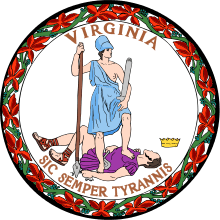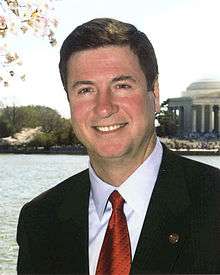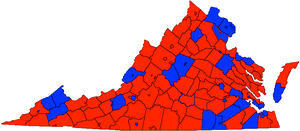United States Senate election in Virginia, 2006
| | |||||||||||||||||||||||||||
| |||||||||||||||||||||||||||
| |||||||||||||||||||||||||||
|
| |||||||||||||||||||||||||||
| U.S. Senate election results map. Blue denotes counties/districts won by Webb. Red denotes those won by Allen. | |||||||||||||||||||||||||||
| |||||||||||||||||||||||||||
| Elections in Virginia | ||||||||||
|---|---|---|---|---|---|---|---|---|---|---|
 | ||||||||||
|
||||||||||
The 2006 United States Senate election in Virginia was held on November 7, 2006. Incumbent Republican U.S. Senator George Allen ran for re-election to a second term, but lost in a narrow race to Democrat Jim Webb.
Background
Allen, who previously served as Governor of Virginia and was considered a possible candidate for president in 2008, was running for his second term. Webb, a decorated Vietnam War veteran, writer and former Secretary of the Navy under Ronald Reagan won the Democratic nomination after being drafted by netroots activists, such as those at the blog Raising Kaine. Polls clearly favored Allen through mid-August, when he was caught on videotape on August 11 twice using an ethnic slur in reference to a Webb campaign volunteer, S.R. Sidarth, who is of Indian ancestry. Allen denied any prejudice in the comment, but his lead shrank considerably. Still, he led in most polls until late October, when several surveys showed Webb with a lead — mostly within the margin of error. The election was not decided until nearly 48 hours after the polls closed, when Allen, behind by a margin of about 0.3%, conceded on November 9, 2006. With all of the other Senate races decided, the outcome swung control of the Senate to the Democrats.[2]
Democratic primary
Candidates
- Harris Miller, businessman
- Jim Webb, former United States Secretary of the Navy
Endorsements
Miller
- Kate Michelman, pro-choice activist[3]
- Several Virginia State Senators
- Alexandria city councilmembers
Webb
- U.S. Senator Harry Reid
- U.S. Senator Tom Daschle
- U.S. Senator Dick Durbin
- U.S. Senator Bob Kerrey
- U.S. Senator John Kerry
- U.S. Congressman John Murtha
- U.S. Congresswoman Leslie Byrne
- U.S. Congressman Owen Pickett
- General Wesley Clark,
- Former State Delegate Chap Petersen
- Former U.S. Senator Chuck Robb and his staff[4]
Finances
Federal Election Commission reports show that in the first part of 2006, Miller raised more than twice as much money as Webb, who entered the race in February. (Miller contributed over $1 million to his own campaign, 60% of what he raised.[5])
Campaign
The week before the primary, Miller said a Webb campaign flier characterized him in an anti-Semitic way; Webb denied that it did.[6]
Results
| Party | Candidate | Votes | % | |
|---|---|---|---|---|
| Democratic | Jim Webb | 83,298 | 53.47 | |
| Democratic | Harris Miller | 72,486 | 46.53 | |
| Total votes | 155,784 | 100.00 | ||
General election
Candidates
- George Allen (R), incumbent U.S. Senator and former Governor
- Gail Parker (G), Air Force veteran
- Jim Webb (D), former United States Secretary of the Navy
Controversies
This election involved several controversies involving both Webb and Allen, but the upset of Webb is mostly the cause of the incumbent, whose approval ratings in the state dropped dramatically during the election.
Platform
Webb focused on his early and outspoken opposition to the war in Iraq, which Allen supported. In a September 4, 2002, Washington Post opinion piece, Webb wrote: "A long-term occupation of Iraq would beyond doubt require an adjustment of force levels elsewhere, and could eventually diminish American influence in other parts of the world."[8] Webb’s son, a U.S. Marine, served in Iraq.
Allen and Webb differed on other issues. Allen is pro-life; Webb, pro-choice. Allen supported George W. Bush’s tax cuts while Webb said more of the benefits should have gone to middle-class Americans.[9] Both candidates supported the death penalty, right-to-work laws, and Second Amendment rights.
Fundraising
Allen retained a substantial lead in fundraising: $6.6 million on hand to Webb’s $1.1 million through 15 September 2006.[10]
Debates
- Meet the Press debate
On September 17, Allen and Webb appeared on NBC's Meet the Press for a debate. Part of the program's debate series on the midterm elections, the debate heavily discussed both the original Gulf War and the present war in Iraq. Host Tim Russert questioned Webb about his initial support for Allen's 2000 U.S. Senate run, as well as what led him to later oppose Allen. Russert also questioned Allen about a remark Webb made concerning his interactions with Allen at the start of the Iraq conflict. Webb asserted that he approached Allen regarding U.S. involvement in the region and cautioned against military action. Webb also claimed that Allen responded to this by saying "You’re asking me to be disloyal to the president." After being questioned on this by Russert, Allen clarified by saying "No, it’s loyalty to this country, and making sure that our country is unified in, in this, in this effort to disarm Saddam Hussein. That was the point." Allen also addressed what he saw as a weakness in Webb, claiming his opponent wanted to withdraw from Iraq. Webb clarified his belief that the U.S. has a commitment to ensure Iraq is stable before withdrawing, but also reasserted that a permanent U.S. presence in Iraq is not an option.
The debate likewise covered an upcoming vote on the use of coercive interrogation methods on enemy combatants. Allen stated that he had not yet made a decision on how to vote, but stated "Now, the key in all of this is I don’t want to stop these interrogations. I’m not for torture, I’m not for waterboarding, but some of these techniques have been very helpful to us, whether they are sleep deprivation, or whether there’s loud music. And I need to be absolutely certain that what the interrogations — interrogators are doing now — which is completely fine as far as I’m concerned, protecting Americans — will not be harmed by the proposal." Webb expressed that this was an issue close to him as a former soldier, but also stated that he did not believe interrogations should be ended completely. Webb however reaffirmed his concerns that if the U.S. abandons the Geneva Convention its soldiers will suffer abroad.
Russert questioned Webb on the recent allegations that his 1979 Washingtonian article fostered hostility towards female students at the Naval Academy. Webb responded as he had in prior press releases, expressing his regret for the repercussions of the article. Russert similarly asked Allen about a statement he made in 2000 in the pages of American Enterprise magazine: "If [Virginia Military Institute] admitted women, it wouldn’t be the VMI that we’ve known for 154 years. You just don’t treat women the way you treat fellow cadets. If you did, it would be ungentlemanly, it would be improper." Allen responded that VMI has made great progress in a co-ed curriculum, making women cadets more of a possibility than at the time he made the statement.[11]
- League of Women Voters debate
On October 9, 2006, the League of Women Voters sponsored a debate between Allen and Webb. The format consisted of the candidates answering series of questions from the moderator, from the LWV panel, and finally from each other. Largely, the responses from the candidates did not expand on the body of knowledge already present in their television and radio commercials. The overall feel of the debate was somewhat combative, with Allen frequently going overtime on responses and a round of uncontrolled verbal jousting after Allen cited Webb's prior statements on raising taxes.
Polling
| Source | Date | Webb (D) | Allen (R) | Parker (IG) |
|---|---|---|---|---|
| SurveyUSA | November 6, 2006 | 52% | 44% | 2% |
| Mason-Dixon | November 4, 2006 | 46% | 45% | 2% |
| Reuters/Zogby | November 2, 2006 | 45% | 44% | |
| Rasmussen | November 2, 2006 | 49% | 49% | |
| CNN | October 31, 2006 | 50% | 46% | |
| Rasmussen | October 29, 2006 | 51% | 46% | |
| Zogby/WSJ | October 28, 2006 | 51% | 47% | |
| GHY (D) | October 26–29, 2006 | 47% | 43% | |
| Rasmussen | October 27, 2006 | 48% | 49% | |
| SurveyUSA | October 25, 2006 | 46% | 49% | 2% |
| LA Times/Bloomberg | October 24, 2006 | 47% | 44% | |
| Mason-Dixon | October 23, 2006 | 43% | 47% | 2% |
| Zogby/WSJ | October 19, 2006 | 47% | 50% | |
| Washington Post | October 15, 2006 | 47% | 49% | 2% |
| Rasmussen | October 12, 2006 | 46% | 49% | |
| USA Today/Gallup | October 6, 2006 | 45% | 48% | |
| Reuters/Zogby | October 5, 2006 | 37% | 48% | |
| Rasmussen | October 2, 2006 | 43% | 49% | |
| SurveyUSA | September 29, 2006 | 44% | 50% | 2% |
| Zogby/WSJ | September 28, 2006 | 44% | 49% | |
| SurveyUSA | September 27, 2006 | 44% | 49% | 2% |
| Mason-Dixon/MSNBC | September 23–27, 2006 | 43% | 43% | 2% |
| Rasmussen | September 15, 2006 | 43% | 50% | |
| SurveyUSA | September 13, 2006 | 45% | 48% | 3% |
| Zogby/WSJ | September 10, 2006 | 50% | 43% | |
| Mason-Dixon | September 10, 2006 | 42% | 46% | |
| Zogby/WSJ | August 27, 2006 | 48% | 47% | |
| SurveyUSA | August 21, 2006 | 45% | 48% | 2% |
| Rasmussen | August 17, 2006 | 42% | 47% | |
| Mason-Dixon | July 30, 2006 | 32% | 48% | |
| Rasmussen | July 27, 2006 | 39% | 50% | |
| Zogby/WSJ | July 24, 2006 | 41% | 52% | |
| Survey USA | June 28, 2006 | 37% | 56% | 2% |
| Zogby/WSJ | June 21, 2006 | 44% | 49% | |
| Rasmussen | June 20, 2006 | 41% | 51% | |
| Rasmussen | April 19, 2006 | 30% | 50% | |
| Zogby/WSJ | March 31, 2006 | 42% | 49% | |
| Rasmussen | March 28, 2006 | 30% | 54% | |
| Rasmussen | February 14, 2006 | 37% | 49% | |
| Rasmussen | December 9, 2005 | 26% | 57% | |
Results
| Party | Candidate | Votes | % | ± | |
|---|---|---|---|---|---|
| Democratic | Jim Webb | 1,175,606 | 49.59% | +1.91% | |
| Republican | George Allen (inc.) | 1,166,277 | 49.20% | -3.05% | |
| Independent Greens | Gail Parker | 26,102 | 1.10% | +1.10% | |
| Write-ins | 2,460 | 0.10% | +0.04% | ||
| Plurality | 9,329 | 0.39% | -4.19% | ||
| Turnout | 2,370,445 | ||||
| Democratic gain from Republican | Swing | ||||
Analysis
Virginia has historically been one of the more Republican Southern states, for instance it was the only Southern state not to vote for Jimmy Carter in 1976, its congressional delegation is mostly conservative, with eight of eleven Congressmen and both Senators belonging to the Republican Party prior to the 2006 election, this made Virginia's Congressional delegation the most Republican of any Southern state. Despite this, Democrats had won the previous two gubernatorial races, in 2001 and 2005. The state's political majority has been changing from conservative white to a mixture of races, especially Hispanic. The state is increasingly diverse; it has the highest percentage of Asians (4.7%, according to the 2005 American Community Survey of the U.S. Census) of any Southern state. 9.9% of Virginians are foreign-born.[13] Webb, like Governor Tim Kaine in 2005, won the four major fast-growing counties in Northern Virginia outside Washington, D.C.; Fairfax, Loudoun, Prince William and Arlington. President Barack Obama carried Virginia by a 6.3% margin over Republican Senator John McCain.
When results began coming in, Allen quickly built a sizeable lead, which began to narrow as the night went on. With 90% of precincts reporting, Allen held a lead of about 30,000 votes , or about 1.5%. However, as votes began to come in from population-heavy Richmond, Webb narrowed the gap, and pulled ahead within the last 1 or 2% of precincts to report. Preliminary results showed Webb holding a lead of 8,942 votes,[14] and many news organizations hesitated to call the election for either candidate until the next day. At 8:41 PM EST on November 8, AP declared Webb the winner.[15] In all Virginia elections, if the margin of defeat is less than half of a percentage point, the Commonwealth of Virginia allows the apparent losing candidate to request a recount, paid for by the local jurisdictions. If the margin of defeat is between one and one-half of a percentage point, the losing candidate is still entitled to request a recount, but must cover its expense.[16][17] Because the difference was less than 0.5%, George Allen could have requested a recount paid for by the government, but declined to make such a request. That was likely because:
- Even in large jurisdictions, recounts — such as those in Florida in 2000 and Washington's 2004 gubernatorial election — rarely result in a swing of more than 1,000 votes, and Allen was trailing by almost 10,000 in the initial count. In particular, almost all votes in this Virginia election were cast using electronic voting machines, whose results are unlikely to change in a recount.
- There was wide speculation that calling for a recount (and still losing) would give Allen a "sore loser" label, which would hurt his future election campaigns, including what some speculated might still involve a 2008 presidential run. However, after losing the senatorial election, on December 10, 2006, Allen announced that he would not be running for president in 2008.
References
- ↑ Dr. Michael McDonald (December 28, 2011). "2006 General Election Turnout Rates". George Mason University. Retrieved March 4, 2013.
- ↑ "Allen concedes, giving Senate control to Dems". CNN. 2006-11-09. Archived from the original on November 10, 2006. Retrieved 2006-11-09.
- ↑ "Endorsing Harris Miller..." (Website). Harris Miller for US Senate. Retrieved 2006-10-01.
- ↑ Wilmore, J.C. (2006-05-24). "U.S. Senator Debbie Stabenow endorses Jim Webb" (Blog). The Richmond Democrat Blog. J.C. Wilmore.
- ↑ "Harris N. Miller: 2006 Politician Profile". The Center for Responsive Politics. 2006-09-15. Retrieved 2006-10-01.
- ↑ Lewis, Bob (2006-06-09). "Flier Blasted on Drawing of Jewish Opponent". ABC News, the Associated Press. Retrieved 2006-10-01.
- ↑ "Archived copy". Archived from the original on September 26, 2011. Retrieved May 21, 2011.
- ↑ Webb, James (2002-09-04). "Heading for Trouble: Do we really want to occupy Iraq for the next 30 years?". Washington Post. p. A21. Retrieved 2006-10-28.
- ↑ "James Webb on the Issues". OnTheIssues.
- ↑ "Total Raised and Spent, 2006 RACE: VIRGINIA SENATE". The Center for Responsive Politics.
- ↑ "Meet the Press Transcript for Sept. 17". MSNBC. 2006-09-17. Retrieved 2006-10-28.
- ↑ http://clerk.house.gov/member_info/electionInfo/2006/2006Stat.htm#46
- ↑ "Virginia - Fact Sheet - American FactFinder". United States Census Bureau.
- ↑ Shear, Michael D.; MacGillis, Alec (November 10, 2006). "Democrats Take Control of Senate As Allen Concedes to Webb in Va". The Washington Post. Retrieved May 27, 2010.
- ↑ Sidoti, Liz, and Bob Lewis (8 November 2006). "Democrats Take Control of the Senate". Associated Press (via Yahoo! News). Retrieved 2006-11-09.
- ↑ Lowy, Joan (8 November 2006). "Recount likely in Virginia Senate race". Associated Press (via Yahoo! News). Retrieved 2006-11-09.
- ↑ "Virginia Recounts -- The Basics" (DOC). Election Laws. Virginia State Board of Elections. November 2006. Retrieved 2006-11-08.
External links
- Meet the Press with Allen and Webb: debate video excerpts, and debate transcript
- 2006 Voter’s Guide by the League of Women Voters of Virginia
- ""Commonwealth of Virginia: November 7, 2006 General Election: Unofficial Results"". State Board of Elections website. Virginia Interactive (Commonwealth of Virginia). Retrieved 2006-11-08. Updated every 2 minutes.
- Maps & graphic displays of the 2006 Virginia election results @ www.VaElection.org
- George Allen
- Jim Webb
- Gail Parker


